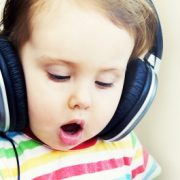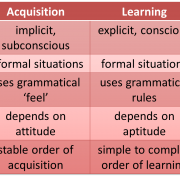Music is key in learning languages
Using regular and repetitive methods to expose children to a language is a great way to teach them the language and music is a great way to do that! A child’s ear naturally atunes to the melody and words without realising it.
“The neurological links between language and music are vast but the basic thing to remember is that music activates more parts of the brain than language does, on both the right and left sides of the brain. So if you remember something to a tune, you are more likely to recall the information than if you just read it or heard it spoken.
Why learn another language?
A study carried out not too long ago by the European Commission, described the only two native English speaking member states, namely the UK and Ireland, as “having moderate language skills” in comparison with other EU countries. About two thirds of the people in the UK and Ireland speak only English whereas the majority of the populations of the other EU member states spoke more than one language. And it’s a pattern which is repeated in most other countries where English is the mother tongue. In Australia, the rates are even lower.
The high rates of bilingualism in Europe are in large part thanks to the dominance of the English language and are not driven by a general desire on the part of Europeans to learn languages but rather by a specific need to learn English. It is by far the most commonly learned language in continental Europe.
What does it take to be a great language teacher?
“Tell me and I forget, teach me and I may remember, involve me and I learn.” – (Benjamin Franklin)
The teacher is one of the single most important components of the language leanrning experience and their teaching style can make the difference between a successful learning outcome for the language student and one in which the student loses confidence in their ability to learn a second language.
Not only will the way a language is taught ultimately determine whether the student will indeed learn the language, it will also influence the way their student’s view language learning in the future. A boring, or uninterested teacher can not only compromise their students’ success with their language learning, they can also instil in their students the belief that they are bad language learners.
So, what is the recipe? In no particular order, and by no means comprehensive, the following list are some key ingredients for being an exceptional language teacher:
Do the languages we speak influence the way we perceive the world?
Do people who speak different languages, whether it’s English, Spanish, Mandarin or any one of the 7000 odd languages in existence, end up remembering and understanding their respective life experiences differently simply by virtue of their mother tongue? An article in the Wall Street Journal explains how recent research suggests that the answer may be yes.
The idea that language might shape thought is not a new one as evinced by quotes implying just that such as this one by the Austrian philosopher, Ludwig Wittgenstein :
“If we spoke a different language, we would perceive a somewhat different world.”
However, the hypothesis has generally been believed to be untestable at best and slightly “off the wall” or relegated to the loony fringes of disrepute at worst.
Now the recent cognitive science research indicates that not only does our language indeed profoundly influence how we see the world, it can also affect our understanding of even such fundamental concepts as space, time and causality.
Read more: Do the languages we speak influence the way we perceive the world?
Are Kiwi students “Asia Ready”?
Our first two days exhibiting at the 2013 NZPF Conference in Hamilton have underscored the fact that there is a growing need for Mandarin as an in-school language option for all New Zealand students with a genuine interest from school principals across the board. And with a talk on Friday by John McKinnon, executive director of the Asia New Zealand Foundation, on why ‘Asia Aware’ students are important, delegates and speakers alike clearly acknowledge the key role of Asia in New Zealand’s future.
A recent survey commissioned by the foundation to determine the ‘Asia Readiness’ of New Zealand secondary students found that only 9% of NZ secondary students were what they considered to be “Asia ready”. The “Asia Readiness Framework”, the key facets of which are knowledge of Asia, cultural intelligence and language, recognises that being “Asia Ready” is as much about an interest and willingness to engage with Asia as it is about the ability to communicate in an Asian language.
The report found that although most New Zealand secondary school students understand the importance of Asia, they feel under-prepared to engage confidently with the region – a finding which clearly demonstrates that “there is a need to increase Asia-related content across the entire school curriculum.”
With the conference theme for 2013 being “Power to Innovate”, we’re looking forward to hearing about some innovative ideas and new solutions on how best to develop “global citizens” who understand the nuances of Asian culture and business practices and who can speak Mandarin and/or other Asian languages.
See the full survey results here
Language Acquistion vs. Language Learning
There is an important distinction made by linguists between ‘language acquisition’ and ‘language learning’.
“Acquisition requires meaningful interaction in the target language – natural communication – in which speakers are concerned not with the form of their utterances but with the messages they are conveying and understanding.” Stephen Krashen (The Natural Approach)
There is an innate capacity for every human being to acquire language and the term ‘language acquisition’ refers to the ways that people acquire language naturally, outside of formal instruction in things like grammar or vocabulary. A child’s need to communicate paves the way for the acquisition of their mother tongue through natural communication and meaningful interaction both with parents and their surrounding environment. This is a subconscious process during which they are unaware of grammatical rules and where the emphasis is on the content of the communication and not the form. Error correction and explicit teaching of rules are not relevant to language acquisition.






